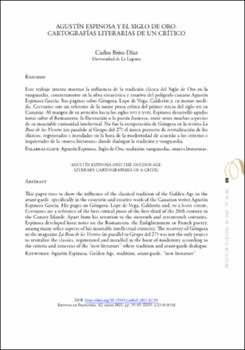Agustín Espinosa y el Siglo de Oro: cartografías literarias de un crítico
Author
Brito Díaz, Carlos
Date
2021Abstract
Este trabajo intenta mostrar la influencia de la tradición clásica del Siglo de Oro en la
vanguardia, concretamente en la obra ensayística y creativa del polígrafo canario Agustín
Espinosa García. Sus páginas sobre Góngora, Lope de Vega, Calderón y, en menor medi-
da, Cervantes son un referente de la mejor prosa crítica del primer tercio del siglo xx en
Canarias. Al margen de su atención hacia los siglos xvi y xvii, Espinosa desarrolló agudas
notas sobre el Romancero, la Ilustración o la poesía francesa, entre otros muchos aspectos
de su insaciable curiosidad intelectual. No fue la recuperación de Góngora en la revista La
Rosa de los Vientos (en paralelo al Grupo del 27) el único proyecto de revitalización de los
clásicos, regenerados e instalados en la hora de la modernidad de acuerdo a los criterios e
inquietudes de la «nueva literatura» donde dialogan la tradición y vanguardia. This paper tries to show the influence of the classical tradition of the Golden Age in the
avant-garde, specifically in the essayistic and creative work of the Canarian writer Agustín
Espinosa García. His pages on Góngora, Lope de Vega, Calderón and, to a lesser extent,
Cervantes are a reference of the best critical prose of the first third of the 20th century in
the Canary Islands. Apart from his attention to the sixteenth and seventeenth centuries,
Espinosa developed keen notes on the Romancero, the Enlightenment or French poetry,
among many other aspects of his insatiable intellectual curiosity. The recovery of Góngora
in the magazine La Rosa de los Vientos (in parallel to Grupo del 27) was not the only project
to revitalize the classics, regenerated and installed in the hour of modernity according to
the criteria and concerns of the “new literature” where tradition and avant-garde dialogue.





